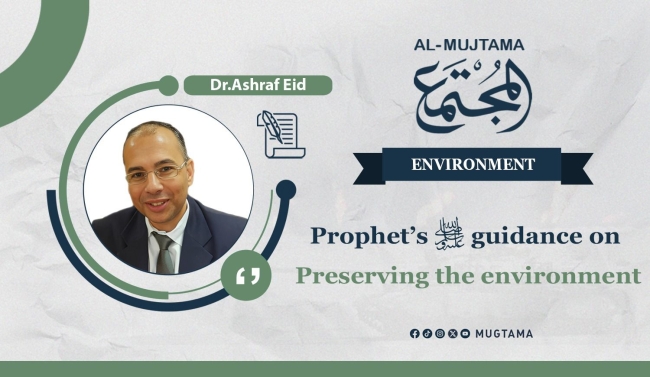Prophet's ﷺ guidance on Preserving the environment
Preserving the environment is essential, and causing any imbalance in it leads to a disruption in ecological balance that harms both humans and living organisms. The Sunnah has set forth general principles for dealing with the environment which, if followed, would have prevented many of today’s environmental problems.
Today, the world is suffering from “global warming,” a phenomenon that represents the increase in Earth's atmospheric temperature due to the excessive rise of gases caused by the industrial revolution and the misuse of environmental resources.
Realizing the imminent threat to life on Earth, 178 nations gathered under the United Nations in 1992 at the “Earth Summit.” During this meeting, the “Climate” convention was signed on March 21, 1994, aiming to reduce global pollution and promote moral values in environmental interaction.
The Quran and Sunnah have placed ethical guidelines governing humans' relationship with the environment to ensure it remains conducive to life. Allah says: “And cause not corruption upon the earth after its reformation. That is better for you if you should be believers” (Al-A'raf: 85), and He says: “Corruption has appeared throughout the land and sea by [reason of] what the hands of people have earned so He may let them taste part of [the consequence of] what they have done” (Ar-Rum: 41).
The Sunnah has laid down principles for interacting with the environment, preserving it, and avoiding misuse. The Prophet Muhammad (ﷺ) urged wise use of the environment without causing harm, so future generations may benefit, an approach now termed “sustainable development,” which, if adopted globally, could mitigate many of the current dangers.
Principles of Environmental Preservation in the Sunnah:
1. Balanced Use of Environmental Resources: The Prophet (ﷺ) stated the general rule for all human dealings: “There should be neither harming nor reciprocating harm.” (1) Thus, preventing harm takes precedence over gaining benefits. Yet, today’s world often prioritizes profit over avoiding harm.
Moderation is a principle in Islam, advocating prudent use of environmental resources and prohibiting wastefulness. When the Prophet (ﷺ) passed by a companion performing ablution, he remarked, “What is this extravagance?” The companion replied, “Is there be any extravagance in ablution?” The Prophet (ﷺ) replied, “Yes, even if you are on the bank of a flowing river.” (2)
2. Preserving Environmental Cleanliness: Though life during the Prophet’s (ﷺ) era was simpler with fewer pollutants, he nonetheless forbade activities that pollute the environment, such as disposing of waste in water, on public pathways, or in areas frequented by people. The Prophet (ﷺ) encouraged removing obstacles from pathways as an act of faith, saying: “Removing harmful objects from the road is a branch of faith.” (3) In another narration, he mentioned that a person who removes a harmful tree from a pathway is rewarded in Paradise. (4)
Water, being essential for life, should remain uncontaminated. Nowadays, water and soil pollution are rampant due to untreated sewage, industrial emissions, and waste disposal, endangering all life forms. (5) Thus, the Prophet (ﷺ) forbade urinating in stagnant or flowing water and polluting it with waste. (6)
3. Preserving Biodiversity: Biodiversity refers to the variety of living organisms in an environment, including animals, plants, and microorganisms. The Prophet (ﷺ) prohibited the unnecessary killing of animals, even if they do not directly benefit humans, due to their role in maintaining ecological balance. He said, “Were dogs not a species of creature I should command that they all be killed; but kill every pure black one.” (7)He also prohibited killing four creatures: the ant, the bee, the hoopoe, and the shrike (8), and forbade killing frogs. (9)
Unfortunately, human overhunting and environmental pollution have endangered and even led to the extinction of many species.
4. Natural Reserves: The Prophet (ﷺ) declared Medina and Mecca as sanctuaries, where hunting and harming animals, as well as cutting trees, are forbidden unless necessary. He said, “Madinah is sacred, the area between ‘Air and Thawr. Whoever commits any offence, or gives refuge to an offender, upon him will be the curse of Allah, the angels and all the people.” (10) Thus, harming the creatures and plants within these sanctuaries is prohibited. (11)
The Prophet (ﷺ) abolished pre-Islamic practices of territorial reserves that led to environmental conflicts by instituting environmental stewardship and protection. For instance, he protected the Naqi’ area, and Caliph Umar protected the Sharf and Rabdha areas. (12)
5. Combating Desertification and Preserving Green Spaces: The rise in Earth’s temperature, a consequence of global warming, contributes to drought, desertification, and decreased green areas, while increasing carbon dioxide levels, which can cause respiratory discomfort.
Many Prophetic traditions emphasize afforestation and land reclamation, whether for fruit-bearing trees or shade. The Prophet (ﷺ) said, “If any Muslim plants something or sows seed from which man, bird, or beast eats, it counts as sadaqa for him.” (13)
The Prophet (ﷺ) also encouraged planting and cultivation, even at the end of times, saying: “If the Final Hour comes while you have a shoot of a plant in your hands and it is possible to plant it before the Hour comes, you should plant it.”(14) Additionally, he prohibited cutting down shade-giving trees, saying, “If anyone cuts down a lote tree, God will lower his head in hell.” (15) Furthermore, he urged reclaiming uncultivated lands by saying, “Whoever revives a barren land, it is his.” (16)
-------------------------------------------------------------
- Sunan Ibn Majah.
- Sunan Ibn Majah.
- Al-Nasa'i, Book of Faith and Its Branches.
- Musnad Ahmad.
- Sunan Abi Dawud.
- Sahih Muslim.
- Sunan al-Tirmidhi.
- Sunan Ibn Majah.
- Sunan Abi Dawud.
- Sahih Muslim with the commentary of Al-Nawawi.
- See: Sahih Muslim with the commentary of Al-Nawawi.
- Sahih al-Bukhari.
- Fath al-Bari.
- Musnad of Imam Ahmad.
- Sunan Abi Dawud.
- Fath al-Bari with the commentary of Sahih al-Bukhari.


